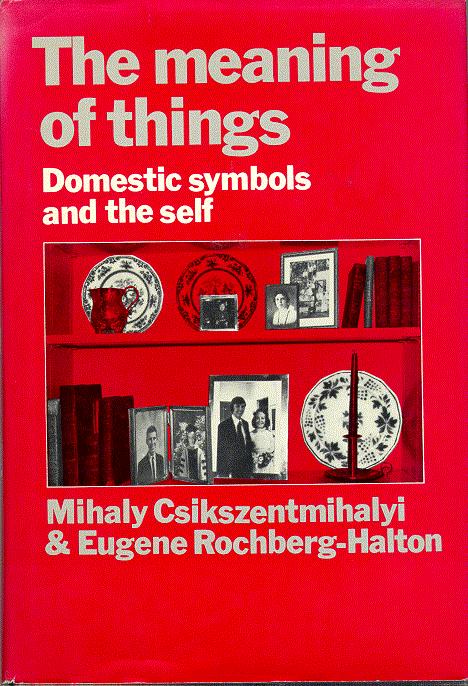
The Meaning of Things: Domestic Symbols and the Self (1981)
By Mihaly Csikszentmihalyi and Eugene Rochberg-Halton
Synopsis: This book is an empirical analysis of the interaction of persons and objects, which seeks to understand "how and why people in contemporary urban American relate to things in their immediate environments" (x). It also seeks to investigate the "role of objects in people's definition of who they are" (x). The methodology of this book stands out as it is a social science study done as a kind of ethnography, relying on interviews and questionnaires of family members living in Chicago. However, the book is mostly centered on theoretical and hypothetical ventures as opposed to detailed discussions of the concrete findings. One of the most striking arguments is that homes/people which lack lots of objects which tie them to other people (i.e. "this is a cup my father made" vs. "this is a comfortable chair") tend to have less ties to communities and less of a connection to causes larger than themselves. Also discovered that "warm" families inspire a sense of purpose and a drive for expertise, whereas "cold" families might leave members focused on themselves and on a search for people who will nurture them. Overall, argues that "things" are embodiments of psychic energy, and the way we equate meaning to that psychic energy relates to how we are connected to others; we have only a finite amount of psychic energy to invest. Bottom Line: "Past memories, present experiences, and future dreams of each person are inextricably linked to the objects that comprise his or her environment" (ix). The authors are also very concerned with the fracturing affect of modernity and the way it has focused so much attention on individuals. The goal should be to reach some kind of larger cosmic connection and to look always for new possibilities and growth.
Interesting Specifics:
Our relationship to objects is part of what makes us human.
"...the potential significance of things is realized in a process of actively cultivating a world of meanings, which both reflect and help create the ultimate goals of one's existence" (xi).
"The condition of community, as Hannah Arendt (1958) has said, is one of plurality, not homogeneity" (11).
"The objects of the household represent, at least potentially, the endogenous being of the owner" (17).
The possession of certain objects seems to also be "an expression of Eros in the broadest sense, a need to demonstrate that one is alive, that one matters, that one makes a difference in the world" (27). [Does this mean that you have no sense of worth if you don't have stuff?]
Durkheim claims that religion originated as a way to explain the mysterious experience of sociability, rather than inexplicable natural phenomena, i.e. the feeling of belongingness made people believe in the existence of a sacred force (33).
Durkheim used term "collective effervescence" to describe the feeling of collective exhilaration that was based on a sum greater than its parts (34).
Agrees with Marx's idea that "humans create their existence primarily through productive efforts" (92).
"For an adult, objects serve the purpose of maintaining the continuity of the self as it expands through time" (100).
Part of maturing is to shift "the center of the self from one's own actions to one's position in a network of enduring relationships" (101).
This book relies on a lot of gender stereotyping - hmm.
"...people who denied meanings to objects also lacked any close network of human relationships" (164).
Interacts With:
Books that deal with the use of objects to construct a sense of self/identity. Is not concerned with social status or class or generic "consumerism," but rather with how objects are embedded with/used to construct meaning.
Goss article
Elvis Culture
American Technological Sublime (discussion of communal experiences or things that bind people together - here through objects, there through amazing feats of technology)

No comments:
Post a Comment